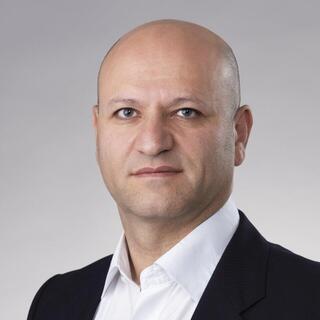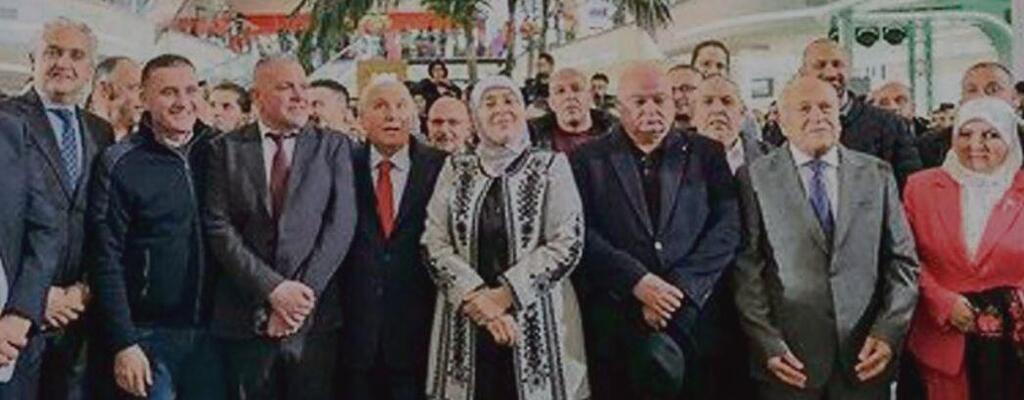Getting your Trinity Audio player ready...
"Gazans are being slaughtered while the people of Ramallah are dancing" was the common phrase in Palestinian discourse this week, against the backdrop of the grand opening of the largest mall in the territories, "Icon Mall," in the town of Surda, north of Ramallah, on Sunday. The festive event included music performances, dancing, and fireworks, accompanied by the presence of senior officials from the Palestinian Authority and Fatah. Crowds, primarily young people, flocked to the shops and flooded social media with photos of their purchases, captioned: "This is not Dubai – this is Ramallah."
3 View gallery


An illustration showing the divide between Ramallah and Gaza
(Photo: Yedioth Ahronoth)
The heated discussion revolved around the gap between "the indulgence of the West Bank"—particularly "the bubble of Ramallah"—and the suffering of residents in Gaza and the northern section of the West Bank, with public outrage expressed sharply on social media. "The blood of thousands of Gazans didn’t spur any protests in Ramallah, but for the mall’s opening, they’re running. What kind of blood flows through their veins," wondered Gazan blogger Khaled Safi.
His colleague Omar Saleh wrote: "We are languishing in Gaza, astonished by pictures from another world." Gazan cartoonist Mahmoud Abbas remarked: "After seeing the mall in Ramallah, I apologize to every Egyptian, Jordanian, Syrian, and Lebanese, and every Arab Muslim I accused of betrayal during the war. Ramallah is closer to Gaza than Cairo, Beirut, and Sana'a… yet still farther away." Social media was also ablaze this week with an illustration juxtaposing the mall event with a grieving Gazan father crouched over the bodies of his children.
The anger was directed at three figures. The first is Laila Ghannam, the governor of Ramallah, who was at the center of the celebrations as a senior representative of the Palestinian Authority. Once called "the only man in Ramallah," she was now portrayed as a symbol of collaboration with Israel and an attempt—via bread and circuses—to obscure national identity and suppress Palestinian resistance aspirations. People shared photos of her visiting the homes of "martyrs" with captions saying: "Laila’s crocodile tears."
"The image of Ghannam with PA officials wasn’t created by AI, but by human stupidity and the moral decay of a group disconnected from their people, living in illusions as if they are running an independent state unrelated to Gaza," said Gazan researcher Younes Abu-Jarad. Analyst Yassin Az al-Din was harsher: "Ghannam looks in the celebratory photo at the mall’s opening like 'The Laughing Cow' [a reference to the cheese brand packaging], surrounded by dozens of donkeys. This isn’t negligence. They are fulfilling their role precisely: openly fighting alongside the occupation against their own people."
The second target of criticism was the mall owner, businessman Gandhi Jaber, who, according to claims, is wanted by the U.S. Drug Enforcement Administration and advanced the project through his connections with the sons of Mahmoud Abbas and Hussein al-Sheikh, who allegedly connected him to Israeli security officials.
The third figure was the mall's CEO, Qassam Barghouti, the son of Marwan Barghouti, a senior Fatah leader imprisoned in Israel and considered by many as Mahmoud Abbas's successor. "Qassam, who insisted on a lavish ceremony, is the son of Marwan, the prisoner for whose freedom Gaza is shedding blood. His actions disgrace his father," said Rami Abdo, a Gazan academic and human rights activist operating in the West.
Hamas identified the potential and sought to stoke the unrest. Ahmad al-Bitawi, a Hamas activist from the West Bank, explained: "A few minutes’ drive from the mall, you reach an Israeli checkpoint that stops thousands of cars of those who just celebrated moments ago. This is the portrait of disconnected Ramallah, living in the illusion of coexistence with Israel and drowning in fake luxuries." Raghed al-Tabasheh, a journalist from Nablus affiliated with the terror organization, added: "Over the past two decades, a detached social class has emerged under the occupation’s sponsorship, controlling the PA’s resources and, by its very existence, prolonging the suffering of all Palestinians."
The outrage of many Palestinians centered on the dance performances at the mall's inauguration. Some were angered by the mixed dances, which they deemed incompatible with Islamic values, while others criticized the dabke performances being accompanied by national songs, which contrasted sharply with the event's indulgent spirit. A campaign to boycott the mall began on social media, but it seems to have gained little traction so far.
Two lessons can be drawn from this event. First, cheerful images challenge claims of oppression or genocide in the West Bank. Second, they highlight gaps not only between Gaza and the West Bank but also within the West Bank itself: in its northern areas, an ongoing conflict with IDF unfolds, with refugee camps in Jenin and Tulkarm being emptied (accompanied by the illusion in Israel that this will erase the memory of Palestinian displacement), while the rest of the West Bank continues its routine.
The exceptional scenes may also explain why, a year and a half after the most intense conflict in the history of the Israeli-Palestinian struggle—marked by unprecedented casualties and destruction in Gaza and a severe economic crisis in the West Bank (mainly due to reduced work permits in Israel)—extreme scenarios like a third Intifada, the collapse of the Palestinian Authority, or a Palestinian Spring have not yet materialized.
However, complacency is unwise. Beyond the ongoing conflict in the West Bank, which continues to generate terror threats mostly thwarted by Shin Bet and IDF, there is an emerging challenge in the form of growing international readiness to recognize a Palestinian state, as French President Emmanuel Macron declared this week. Without an Israeli strategy or willingness to address the issue, it’s likely France is only the first sign, and Netanyahu may face more tough conversations like the one he had with Macron this week.
"Macron’s statement reflects a widening convergence of interests between France, other European elements, and the Arab world regarding the Palestinian issue. In June, a conference is planned in New York, led by the French and Saudis, to discuss the question of a Palestinian state," explained Patrice Paoli, a former French ambassador to Lebanon. Conversely, Palestinian columnist Hussam Abu-Hamid argued: "Recognizing a Palestinian state without defining its status and borders is insufficient. After all, 148 out of 193 U.N. member states have already recognized it. These moves must be accompanied by decisive actions against Israel, primarily regarding its continued fighting in Gaza and international court claims against its leaders."
Get the Ynetnews app on your smartphone: Google Play: https://bit.ly/4eJ37pE | Apple App Store: https://bit.ly/3ZL7iNv
In Israel, some draw optimism from the images in Ramallah. Some argue they reflect a lack of solidarity, proving "there is no Palestinian people," forgetting similar scenes of Israelis, including officials, enjoying life amid ongoing suffering, especially of captives and their families. Others conclude that it proves economic stability can lead to security stability. Meanwhile, others, led by Smotrich, claim that the fracture in the Palestinian arena and the Trump era provide Israel with a rare opportunity to change the dynamics in the West Bank and promote annexation—all while ignoring surprises from Washington, such as talks with Iran or the fading interest in the transfer vision that Israel still clings to.
This is likely the short Israeli memory that forgets the collapse of the "economic peace" thesis on October 7. Money can buy temporary quiet, but avoiding discussions on the Palestinian issue comes with costs the public must be aware of and demand clarifications from leadership—ranging from the risk of another October 7 to the growing fusion between Israel and the West Bank, threatening the Zionist vision with a one-state reality.
- Dr. Michael Milshtein is an expert on the Palestinian Arena and the Head of the Palestinian Studies Forum at the Moshe Dayan Center




